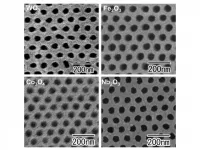(Press-News.org) A fear of poor SATs results is driving headteachers to separate pupils by ability despite the impact on children's self-esteem and confidence, according to a study by researchers from UCL published in the peer-reviewed British Journal of Sociology of Education.
The findings, based on a survey of nearly 300 principals of primary schools in England, provide new evidence of a high-stakes culture around testing where some pupils are prioritised above others and physically segregated from them.
More than a third (35%) of headteachers said SATs were the reason for grouping children into different ability sets for English, and just under half (47%) for maths, according to the results which also include in-depth interviews with school principals.
Other practices adopted by schools include targeting resources at pupils on the borderline of passing SATs at the expense of 'hopeless' cases. The most significant finding was the growth of 'intervention' sessions where children are removed from normal lessons or playtime to plug gaps in their learning and be 'fixed' academically.
The authors warn that these approaches are part of a 'potentially damaging' system where some children are made to feel inferior and which raises questions about how groupings 'might exacerbate inequalities'.
A debate is needed, they say, about the consequences for primary school children of high-pressured learning assessments, and also for staffing and resources.
"These forms of disciplinary power are encouraged by the disciplinary function of SATs themselves," says Dr Alice Bradbury from UCL Institute of Education.
"They place pressure on headteachers to prioritise results over the broader purposes of education.
"The SATs are in themselves a practice of division, designating children as at age related expectation (ARE) or not. This binary between success and failure, passing or failing, is a brutal division of children at age 11.
"Early evidence from teachers suggests that there is a strong desire for change following the (Covid) crisis, including the removal of testing."
Standard Assessment Tests (SATs) are used to assess a child's educational progress and form the basis of school league tables. The most significant (Key Stage 2) take place in May of the final year of primary education (year 6). For this type of testing, the focus of recent research has been largely international, not on how schools in England are affected or on headteachers' views.
This study involved an online survey from March to June 2019 of 288 heads about the impact of SATs in general and on issues such as staffing and extracurricular sessions. Comprehensive interviews were also conducted with 20 headteachers at a range of schools across England.
Education leaders at faith schools, academies and community primary schools were among those who took part, with 'good' the most common Ofsted rating.
The research focused on the impact on teachers and children from assessment policies which put pressure on schools.
The findings showed evidence of three approaches towards separating children in relation to SATs. The first was dividing by ability into sets, despite what the authors say is 'increasing evidence of the disadvantages'. In some schools, pupils physically moved from their normal class to different rooms/teachers, and some were even streamed permanently.
Several heads expressed concern about putting children in sets and some rejected the practice. One headteacher commented that 'pupils get into a psyche of failure because they've always been in the bottom set'.
Another approach which was commonplace involved 'booster' sessions - singling out children on the cusp of achieving a benchmark SAT grade. These are a feature of educational 'triage' where students are sorted into who will fail, pass with help, or succeed without extra support.
The authors also identified a new variant of this triage system which they say has been triggered by the 'increasing complexity of school league tables'. These involved pupils on the borderline of reaching 'greater depth' (above the expected level for year 6) who are given special support, for example, before school and during holidays.
The final practice was what the authors call 'intervention culture' where some pupils are withdrawn from normal lessons to resolve 'gaps' in their learning. They say this intensifies division by excluding those children in need of additional help from other parts of the curriculum.
The authors acknowledge that divisions created by these practices would not disappear entirely without SATs, which are currently suspended because of the pandemic. However, they suggest these tests might be replaced with 'more nuanced ways of understanding a child's attainment'. They add: "There can be no triage or 'cusp' if there is no benchmark to judge them by."
INFORMATION:
In the world of neurodevelopment, one thing is clear: the earlier the intervention the better. Infancy is a critical time in brain development, and neuroscientists are increasingly identifying factors that can negatively impact cognition and ones that can improve cognition early in life. At the annual meeting of the Cognitive Neuroscience Society (CNS), researchers from the University of Minnesota are presenting new work on two early interventions: one on the potential use of engineered gut microbes for antibiotic-exposed infants and another on a choline supplement to treat infants exposed prenatally to alcohol.
"These talks underscore how patient-based neuroscience can advance ...
Men experiencing vital exhaustion are more likely to have a heart attack, according to research presented today at ESC Acute CardioVascular Care 2021, an online scientific congress of the European Society of Cardiology (ESC).1 The risk of a myocardial infarction linked with exhaustion was particularly pronounced in never married, divorced and widowed men.
"Vital exhaustion refers to excessive fatigue, feelings of demoralisation and increased irritability," said study author Dr. Dmitriy Panov of the Institute of Cytology and Genetics, Novosibirsk, Russian Federation. "It is thought to be a response to intractable problems in people's lives, particularly when they are unable to adapt to prolonged ...
Tokyo, Japan - Scientists from Tokyo Metropolitan University have developed a new method for making ordered arrays of nanoholes in metallic oxide thin films using a range of transition metals. The team used a template to pre-pattern metallic surfaces with an ordered array of dimples before applying electrochemistry to selectively grow an oxide layer with holes. The process makes a wider selection of ordered transition metal nanohole arrays available for new catalysis, filtration, and sensing applications.
A key challenge of nanotechnology is getting control over the structure of materials at the nanoscale. In the search for materials that are porous at this length scale, the field of electrochemistry offers a particularly elegant ...
MRI scanning can more precisely define and detect head, neck, thoracic, abdominal and spinal malformations in unborn babies, finds a large multidisciplinary study led by King's College London with Evelina London Children's Hospital, Great Ormond Street Hospital and UCL.
In the study, published today in Lancet Child and Adolescent Health, the team of researchers and clinicians demonstrate the ways that MRI scanning can show malformations in great detail, including their effect on surrounding structures. Importantly, they note that MRI is a very safe procedure for pregnant women and their babies.
They say the work is invaluable both to clinicians caring for babies before they are born and for teams planning care of the baby after delivery.
Recent research has concentrated ...
The Affordable Care Act (ACA) dramatically increased children's preventive healthcare while reducing out-of-pocket costs, according to a new Boston University School of Public Health (BUSPH) study.
Published in JAMA Network Open, the study found that checkups with out-of-pocket costs dropped from 54.2% of visits in 2010 (the year the ACA passed) to 14.5% in 2018.
"This is a great feather in the cap of the ACA, even though there is still some work to do," says study lead author Dr. Paul Shafer, assistant professor of health law, policy & management at BUSPH.
"We found ...
MIAMI--A new study lead by scientists at the University of Miami (UM) Rosenstiel School of Marine and Atmospheric Science demonstrates that under realistic environmental conditions oil drifting in the ocean after the DWH oil spill photooxidized into persistent compounds within hours to days, instead over long periods of time as was thought during the 2010 Deepwater Horizon oil spill. This is the first model results to support the new paradigm of photooxidation that emerged from laboratory research.
After an oil spill, oil droplets on the ocean surface ...
Cancer cells can dodge chemotherapy by entering a state that bears similarity to certain kinds of senescence, a type of "active hibernation" that enables them to weather the stress induced by aggressive treatments aimed at destroying them, according to a new study by scientists at Weill Cornell Medicine. These findings have implications for developing new drug combinations that could block senescence and make chemotherapy more effective.
In a study published Jan. 26 in Cancer Discovery, a journal of the American Association for Cancer Research, the investigators reported that this biologic process could help explain why cancers so often recur after treatment. The research was done in both organoids and mouse models ...
A study of the relationship between temperature and yields of various rice varieties, based on 50 years of weather and rice-yield data from farms in the Philippines, suggests that warming temperatures negatively affect rice yields.
Recent varieties of rice, bred for environmental stresses like heat, showed better yields than both traditional rice varieties and modern varieties of rice that were not specifically bred to withstand warmer temperatures. But the study found that warming adversely affected crop yields even for those varieties best suited to the heat. Overall, the advantage of varieties bred to withstand increased heat was too small to be statistically significant.
One of ...
Intake of a high-fat diet leads to an increased risk for obesity, type 2 diabetes, cardiovascular diseases and fatty liver. A study in mice from Karolinska Institutet in Sweden shows that it is possible to eliminate the deleterious effects of a high-fat diet by lowering the levels of apolipoprotein CIII (apoCIII), a key regulator of lipid metabolism. The study is published in the journal Science Advances.
Increased levels of the protein apoCIII are related to cardiovascular diseases, insulin resistance and type 2 diabetes. Researchers at the Rolf Luft Research ...
New research led by the University of Cambridge has found rare evidence - preserved in the chemistry of ancient rocks from Greenland - which tells of a time when Earth was almost entirely molten.
The study, published in the journal Science Advances, yields information on a important period in our planet's formation, when a deep sea of incandescent magma stretched across Earth's surface and extended hundreds of kilometres into its interior.
It is the gradual cooling and crystallisation of this 'magma ocean' that set the chemistry of Earth's interior - a defining stage in the assembly of our planet's structure and the formation of our early atmosphere.
Scientists know that catastrophic impacts during the formation of the Earth and Moon would have generated ...


